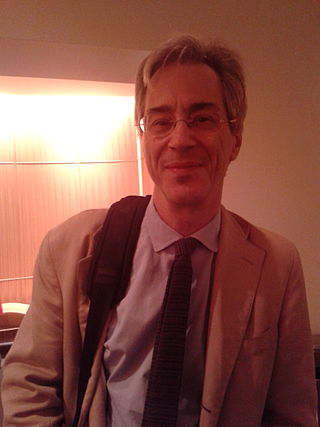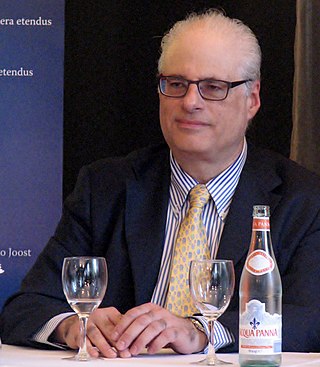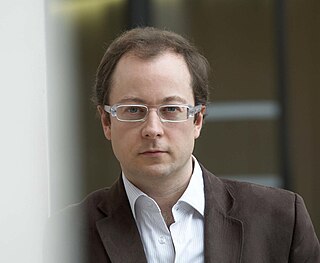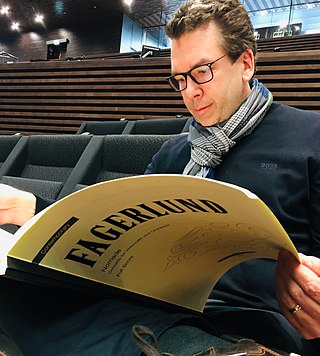Related Research Articles

Milton Byron Babbitt was an American composer, music theorist, mathematician, and teacher. He was a Pulitzer Prize and MacArthur Fellowship recipient, recognized for his serial and electronic music.
Shulamit Ran is an Israeli-American composer. She moved from Israel to New York City at 14, as a scholarship student at the Mannes College of Music. Her Symphony (1990) won her the Pulitzer Prize for Music. In this regard, she was the second woman to win the Pulitzer Prize for Music, the first being Ellen Taaffe Zwilich in 1983. Ran was a professor of music composition at the University of Chicago from 1973 to 2015. She has performed as a pianist in Israel, Europe and the U.S., and her compositional works have been performed worldwide by a wide array of orchestras and chamber groups.
John Harris Harbison is an American composer, known for his symphonies, operas, and large choral works.
Richard Danielpour is an American composer.
Joseph Clyde Schwantner is a Pulitzer Prize-winning American composer, educator and a member of the American Academy of Arts and Letters since 2002. He was awarded the 1970 Charles Ives Prize.
Bernard Rands is a British-American contemporary classical composer. He studied music and English literature at the University of Wales, Bangor, and composition with Pierre Boulez and Bruno Maderna in Darmstadt, Germany, and with Luigi Dallapiccola and Luciano Berio in Milan, Italy. He held residencies at Princeton University, the University of Illinois, and the University of York before emigrating to the United States in 1975; he became a U.S. citizen in 1983. In 1984, Rands's Canti del Sole, premiered by Paul Sperry, Zubin Mehta, and the New York Philharmonic, won the Pulitzer Prize for Music. He has since taught at the University of California, San Diego, the Juilliard School, Yale University, and Boston University. From 1988 to 2005 he taught at Harvard University, where he is Walter Bigelow Rosen Professor of Music Emeritus.
Carl Edward Vine, is an Australian composer of contemporary classical music.

Stephen Jaffe is an American composer of contemporary classical music. He lives in Durham, North Carolina, United States, and serves on the music faculty of Duke University, where he holds the post of Mary and James H. Semans Professor of Music Composition; his colleagues there include composers Scott Lindroth, John Supko, and Anthony Kelley. Jaffe graduated summa cum laude from the University of Pennsylvania in 1977; he received a master's degree the following year from the same institution. During his time in Pennsylvania, he studied with George Crumb, George Rochberg, and Richard Wernick.
Margaret Brouwer is an American composer and composition teacher. She founded the Blue Streak Ensemble chamber music group.
Martin Boykan was an American composer known for his chamber music as well as music for larger ensembles.

Jay Reise is an American composer.
Huw Thomas Watkins is a British composer and pianist. Born in South Wales, he studied piano and composition at Chetham's School of Music in Manchester, where he received piano lessons from Peter Lawson. He then went on to read music at King's College, Cambridge, where he studied composition with Robin Holloway and Alexander Goehr, and completed an MMus in composition at the Royal College of Music, where he studied with Julian Anderson. Huw Watkins was awarded the Constant and Kit Lambert Junior Fellowship at the Royal College of Music, where he used to teach composition. He is currently Honorary Research Fellow at the Royal College of Music.
Robert Charles Suderburg was an American composer, conductor, and pianist.
Steven Roy Gerber was an American composer of classical music. He attended Haverford College, graduating in 1969 at the age of twenty. He then attended Princeton University with a fellowship to study musical composition.
Miguel del Águila is an Uruguayan-born, American composer of contemporary classical music.

David Serkin Ludwig is an American composer, teacher, and Dean of Music at The Juilliard School. His uncle was pianist Peter Serkin, his grandfather was the pianist Rudolf Serkin, and his great-grandfather was the violinist Adolf Busch. He holds positions and residencies with nearly two dozen orchestras and music festivals in the US and abroad. His choral work, The New Colossus, was performed at the 2013 presidential inauguration of Barack Obama.

Tigran Yeghiayi Mansurian is a leading Armenian composer of classical music and film scores, People's Artist of the Armenian SSR (1990), and Honored Art Worker of the Armenian SSR (1984). He is the author of orchestral, chamber, choir and vocal works, which have been played across the world. He was nominated for Grammy awards in 2004 and 2017.

Guillaume Connesson is a French composer born in 1970 in Boulogne-Billancourt.

Sebastian Fagerlund is a Finnish composer. He is described as “a post-modern impressionist whose sound landscapes can be heard as ecstatic nature images which, however, are always inner images, landscapes of the mind”. Echoes of Western culture, Asian musical traditions, and heavy metal have all been detected in his music.
John Kinsella was an Irish composer and the country's most prolific symphonist during the twentieth century.
References
- ↑ Cheifetz, Tori. "Never Compromise." The Jerusalem Post. January 28, 2009, p. 24.
- 1 2 3 4 5 6 7 Hirshberg, Jehoash. "Wernick, Richard." Grove Music Online. Oxford Music Online.
- ↑ Richard Wernick at IMDb
- ↑ Stearns, David Patrick. "Philadelphia's Latest Generation of Emerging Composers". The Philadelphia Inquirer. May 2, 2010, p. H01
- ↑ Holland, Bernard. "Riccardo Muti Makes Music His Way". The New York Times. October 9, 1983, Arts and Leisure p. 1
- 1 2 3 4 5 6 7 8 9 10 11 12 13 14 15 16 17 18 19 20 21 22 Theodore Presser Company. "Wernick, Richard"
- ↑ Duffie, Bruce. "Composer Richard Wernick: A Conversation with Bruce Duffie", December 27, 1993
- ↑ Horowitz, Joseph. "Wernick's 'Introits and Canons'". The New York Times. January 15, 1978, p. 47.
- ↑ Theodore Presser Company. Richard Wernick: List of works
- ↑ Kozinn, Allan. "Holding onto a Niche, Very Firmly". The New York Times. October 9, 2011, p. 21
- ↑ Bridge Records Catalog, http://www.bridgerecords.com/catpage.php?call=9303
- ↑ Unless otherwise indicated, list of awards sourced from Theodore Presser Company. "Wernick, Richard"
- ↑ Holland, Bernard (September 7, 1992). "Awards Are Made to the Minds And Notes of Four Composers". The New York Times
- ↑ The New York Times (November 13, 1991). "4 Composers Honored At Kennedy Center"
- 1 2 3 4 5 6 7 8 Kuhn, Laura (2000). "Wernick, Richard", Baker's Dictionary of Opera, p. 886. Schirmer Books. ISBN 0-02-865349-1